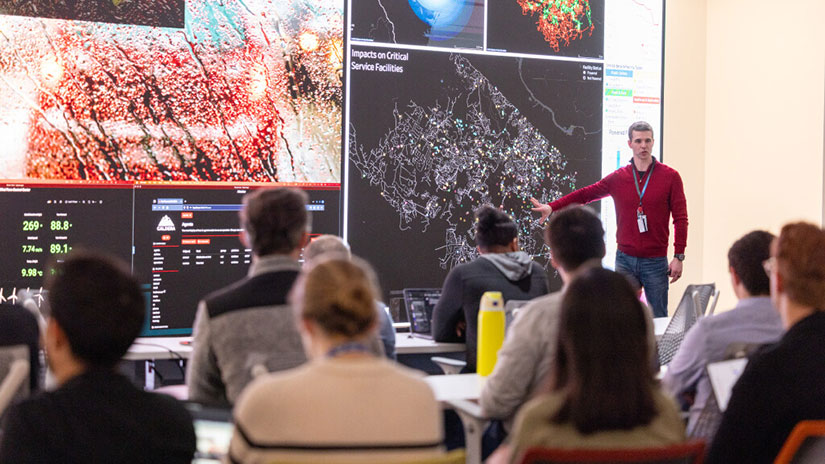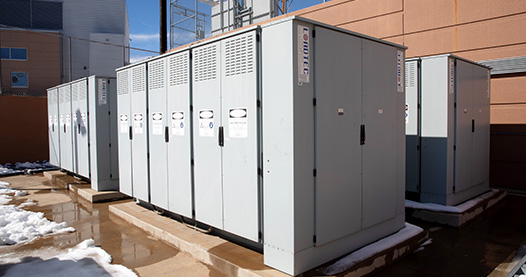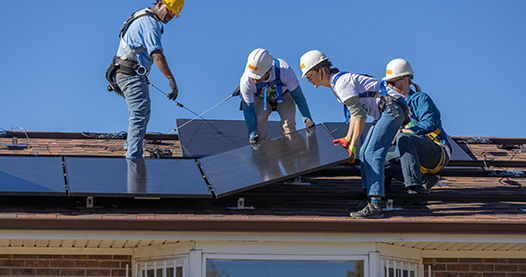Energy to Communities Program: Peer-Learning Cohorts
Energy to Communities (E2C) offers peer-learning cohorts to advance local energy goals. Peer-learning cohorts are funded by the U.S. Department of Energy and managed by NREL.

What Are E2C Peer-Learning Cohorts?
Peer-learning cohorts are multicommunity engagements that convene community entities around a common energy topic. Participants meet regularly for approximately 6 months to exchange strategies and best practices, learn in a collaborative environment, and workshop policy or program proposals, action plans, or strategies to overcome challenges.
In each cohort, experts provide up to 15 participants with case studies, analysis and modeling tools, templates, training materials, and facilitated collaboration to accelerate energy progress.
More than 200 community entities have participated in one of 15 cohorts.
E2C is now accepting applications for two new peer-learning cohorts:
- Engaging with utilities
- Navigating electricity load growth.
Upcoming Peer-Learning Cohort Topics
The next round of peer-learning cohorts will start in July 2025. E2C is accepting applications until May 7, 2025, for two cohort topics.
Cohort Description
This cohort will prepare participants to engage and partner with their electric utilities by building a foundational knowledge of the utility industry. Participants will learn about public engagement and partnership opportunities that exist within current utility models and explore innovative opportunities for collaboration. To enable effective communication between participants and their utilities, the cohort will also cover the basics of how utilities are regulated, their core functions and business models, and policies. Specific topics may include:
- Existing opportunities for utility engagement and partnerships
- Utility programs
- Utility regulatory structures, organization types, and industry trends
- Utility rate structures
- Utility functions, investments, and profit motives
- Resource planning, distributed generation, and demand-side management.
Expected Outcomes
Participants will leave the cohort with a better understanding of utility motivations as well as the opportunities and limitations of collaborating with electric utilities. By the last session, participants will be equipped to build and strengthen relationships with their electric utility and will be empowered to outline a proposed pathway to work with their utility to move an energy project forward or meet community energy goals.
Ideal Participants
Ideal participants include planning staff and energy managers of local governments, Tribes, and regional government entities.
Eligible Entities
- Local governments (cities, towns, villages, counties, etc.)
- Regional government organizations (councils of governments, etc.)
- Tribes, including Alaska Native Villages, Alaska Native Corporations, and state-recognized Tribes
Preview the engaging with utilities application questions and apply by May 7, 2025.
Cohort Description
This cohort will explore the potential impacts and strategies for managing new and emerging demands on the electrical grid, including new data centers, the expansion of domestic manufacturing, and changing building power sources and transportation fuels. Workshops will cover topics such as stakeholder priorities, strategies to meet energy requirements, infrastructure needs, and opportunities to accelerate siting and construction.
Expected Outcomes
Participants will:
- Understand how to create local benefits and manage risks associated with new energy projects and development activities that impact local electric grids
- Understand the role their entity can play in navigating community load growth and infrastructure planning
- Plan steps to proactively manage energy project requirements and address load growth and infrastructure needs in collaboration with other local stakeholders including private industry and utilities.
Ideal Participants
- Planning or economic development staff at local governments, Tribes, and regional government organizations
- Economic development, government affairs, and community partnerships leads for utilities, or any staff from rural or small utilities
- Representatives from nonprofit economic development organizations
Eligible Entities
- Local governments (cities, towns, villages, counties, etc.)
- Tribes, including Alaska Native Villages, Alaska Native Corporations, and state-recognized Tribes
- Regional government organizations (councils of governments, etc.)
- Economic development organizations
- Municipal electric utilities or electric co-ops
Preview the navigating electricity load growth application questions and apply by May 7, 2025.
E2C Peer-Learning Cohorts Participants
For a list of current and past cohorts, visit the Current and Past Peer Learning Cohorts page.
Eligibility
Peer-learning cohorts are intended for participants that have decision-making power or influence in their community entities but need access to additional energy expertise to inform upcoming opportunities. Eligible primary applicants for cohort topics may include:
- Tribes, including Alaska Native Villages, Alaska Native Corporations, and state recognized Tribes
- City, town, or county (local) governments
- Metropolitan planning organizations
- Regional planning organizations
- Municipal and cooperative utilities
- Community-based organizations
- Other public entities, such as transit agencies, school districts, and housing authorities.
Contact
If you have questions about E2C Peer-Learning Cohorts, please email E2C.
Sign up for E2C email updates to be notified when program applications open.
Share
Last Updated April 16, 2025


